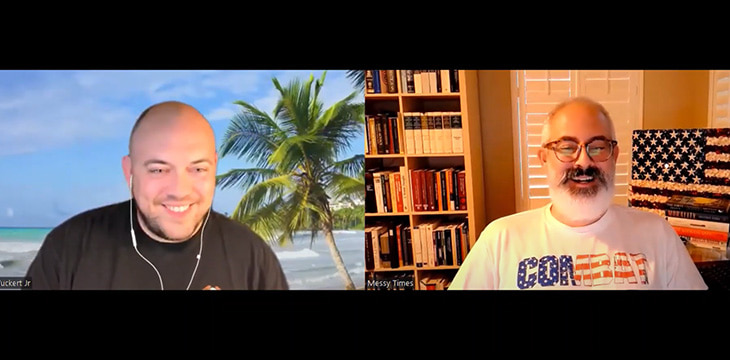|
Getting your Trinity Audio player ready...
|
Kurt Wuckert Jr. joined the Messy Times podcast to speak to Christopher Messina again. They talked about the recent Granath vs. Wright trial and so much more.
Recapping the trial
The Messy Times podcast isn’t aimed at a strictly Bitcoin SV (BSV)-centric audience, so Wuckert begins by recapping the recent Granath vs. Wright trial. He explains how Magnus Granath, also known as Hodlonaut, pursued a trial as he felt his rights had been violated because Dr. Craig Wright put a price on his identity after he slandered him.
He also explains how the small blocker cult turned on him for mentioning Granath’s identity on Twitter (NASDAQ: TWTR). They ended up doxxing his family and putting them in danger to intimidate him for his truthful reporting.
The ruling on the trial will be in November, Wuckert tells Messina, noting that the judge went on vacation right after the trial.
Explaining what lay at the heart of the trial, Wuckert explains that it was really about whether or not using your influence on social media to brand someone a fraud is political speech or not. This is essentially the argument Granath’s team made. Furthermore, they took the position that he is a bully but that this is a good thing.
“They doubled down on saying Craig Wright is a fraud,” he emphasizes, saying Granath fully owned being toxic.
Explaining this toxicity further, Wuckert notes that Granath was often seen laughing and snickering at Dr. Wright’s witnesses, many of whom were highly credentialed professionals who had known him for a long time.
Wuckert notes that the judge was deeply interested in Dr. Wright as a person. He explains the contrast between the two—Granath came across as an average guy with a nasty streak while Dr. Wright was impressive, explaining his many post-graduate degrees and accomplishments. Wuckert says he thinks this made Dr. Wright look good and Granath as if he is just an angry school teacher with a grudge.
The significance of the Sartre blog post
Wuckert talks a little about the various proof presented at trial, including Granath’s evidence for thinking Dr. Wright is a fraud. One of these was the Jean-Paul Sartre blog post.
However, Wuckert explains the deeper significance of the post. In it, Sartre explained that he didn’t want to claim his Nobel Prize because then he would not be the same—that’s what he would be remembered for. When Dr. Wright published this post, he essentially said the same thing while making a philosophical point about identity and how it is established.
In court, the expert witness that was brought in to explain how one would prove his identity cryptographically and why the Sartre post was invalid could not recall the posts’ content and did not know who the philosopher even was. Showing him up like this was one of the many master strokes by Dr. Wright’s attorney Halvor Manshaus.
The apolitical nature of Bitcoin
After some brief chat about politics, Wuckert notes similarities between the Bitcoin white paper and the United States constitution. While one is legal and the other is more philosophical and technical, in the end, they both outline rules which define the system.
Likewise, you can tell someone’s political persuasion by how they react to both documents. Those who feel the constitution is old and outdated are liberals, and those who think it is a foundational document that underpins everything are conservatives. The same applies to the Bitcoin whitepaper.
Going further, Wuckert likens anyone’s position on Bitcoin to religious belief. There’s an infinite amount of scholarship for all major schools of thought claiming they are right and everyone else is wrong. He asks if it really matters – at the end of the day, people from all of the world’s major traditions can do business together, get along if they choose to, and live in peace.
“We could all be wrong,” Wuckert reflects, noting that Bitcoin hasn’t been truly tested yet.
Sadly, this attitude is not shared by some of the hardcore BTC cultists who have attacked Wuckert and doxxed his family and private details. He says he has been under constant cyberattacks, personal and financial information leaked, threats, and more, all because he reported on this case. He interprets this as fear, given how the trial went and how the truth is coming out little by little every day.
The Digital Asset Recovery Tool
Wuckert briefly explains how the new node software on BSV, the Blacklist Manager, will be used in conjunction with other software to enable coin freezing and recovery. He says many people are up in arms about this, but they don’t understand that this is how the system was designed. There has even been a fair amount of pushback in the BSV community.

 02-28-2026
02-28-2026 




